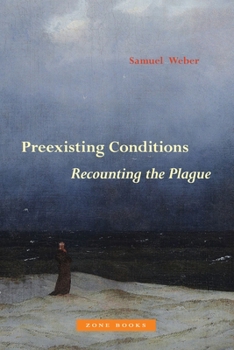Preexisting Conditions: Recounting the Plague
Select Format
Select Condition 
Book Overview
A stunning philosophical and literary account of canonical plague tales
Many are the losses suffered and lives lost during the recent COVID-19 pandemic. Since 2020, writers around the globe have penned essays and books that make sense of this medical and public health catastrophe. But few have addressed a pressing question that precedes and is the foundation of their writings: How does the very act of narrating the pandemic offer strategies to confront and contend with the pandemic's present dangers? What narratives have been offered during past plague and pandemic times to ease suffering and loss and protect individuals and communities from a life lived under the most precarious of conditions? The philosopher and literary and cultural critic Samuel Weber returns to past narratives of plagues and pandemics to reproduce the myriad ways individual and collective, historical and actual, intentional and unintentional forces converge to reveal how cultures and societies deal with their vulnerability and mortality. The "preexisting conditions"--a phrase taken from the American healthcare industry--and singular conditions of these very cultures converge and collide. Singular beings--as tales from the Bible, Sophocles, Thucydides, Boccaccio, Luther, Defoe, Kleist, Holderlin, and Camus, among the few whose accounts Weber recounts--are called upon to redefine their relationship to others and in so doing to the collectives to which they belong and on which they depend.Format:Hardcover
Language:English
ISBN:1942130767
ISBN13:9781942130765
Release Date:September 2022
Publisher:Zone Books
Length:224 Pages
Weight:1.15 lbs.
Dimensions:0.9" x 6.1" x 9.1"
Customer Reviews
0 rating





